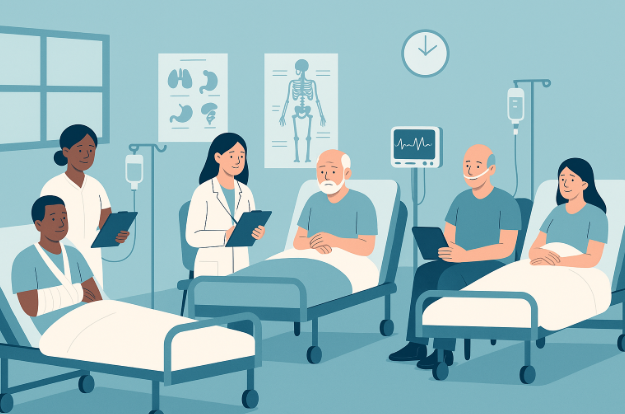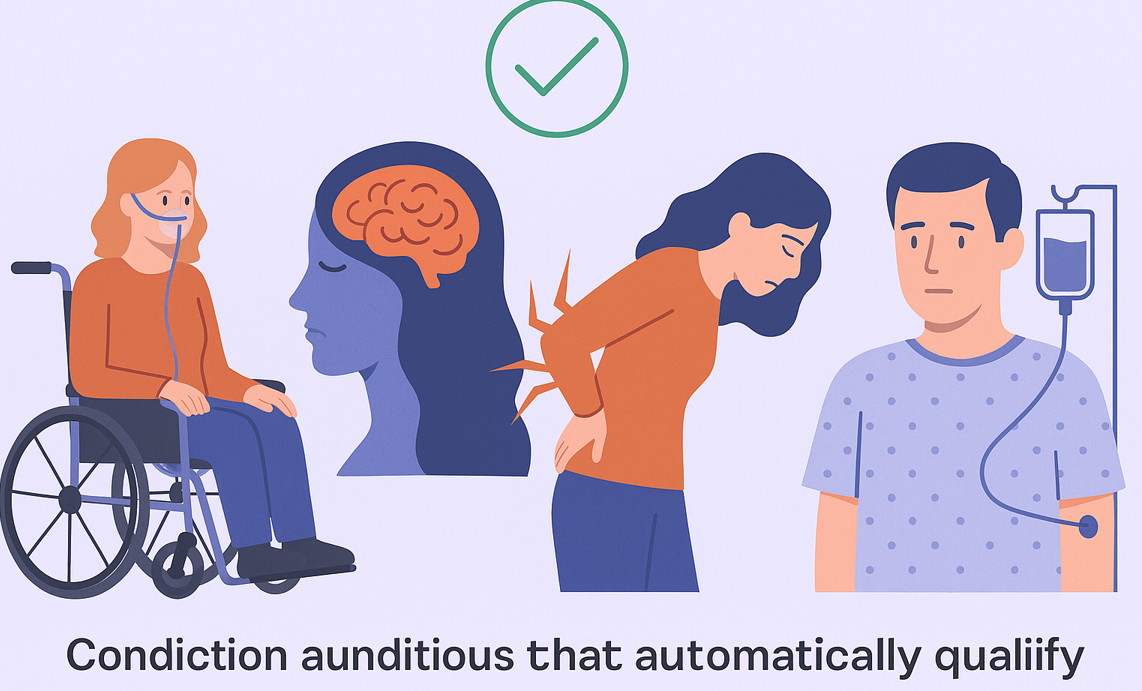If you’re navigating the complex world of Universal Credit, understanding the conditions that automatically qualify you for LCWRA (Limited Capability for Work and Work-Related Activity) can make a big difference. Whether you’re living with a long-term health issue, a mental health condition, or facing a terminal illness, knowing your rights and eligibility could mean faster access to the support you deserve—without unnecessary assessments.
Let us guide you through all the necessary information.
What Does LCWRA Mean in Universal Credit?
If you’ve come across the term LCWRA, it refers to people who are considered unable to work or take part in work-related activities due to a health condition or disability. It is a component of Universal Credit’s Work Capability Assessment (WCA).
How is LCWRA Different from LCW?
There are two main categories:
-
LCW (Limited Capability for Work): You’re not expected to work now but may prepare for work in the future.
-
LCWRA (Limited Capability for Work and Work-Related Activity): You’re not expected to work or even engage in preparation activities because of the severity of your condition.
Why is LCWRA Important for Claimants?
Being placed in the LCWRA group means:
-
You won’t have to hunt for a job.
-
Your Universal Credit payment will include an additional sum.
-
Your work coach won’t pressure you into job-related tasks
Who Decides If You Qualify for LCWRA?

What is the Work Capability Assessment?
Your capacity to work is determined by the Work Capability Assessment (WCA). It’s usually triggered by:
-
Submitting a fit note from your GP
-
Reporting a health condition through your Universal Credit journal
You’ll often be asked to complete a UC50 form and may be invited to a medical assessment.
What Role Does the DWP and Your GP Play?
-
Your GP provides medical evidence (fit notes)
-
The Department for Work and Pensions (DWP) reviews your health information, UC50 form, and any assessment to decide your LCWRA status
Do you get LCWRA on top of Universal Credit?
Yes, LCWRA is paid on top of your standard Universal Credit payment. If you’re eligible, you’ll receive an additional £416.19 per month (as of 2025). This is designed to support claimants who can’t work due to serious health conditions or disabilities.
What Are the Conditions That Automatically Qualify You for LCWRA?
Some conditions are automatically qualifying, meaning you may not need a face-to-face medical assessment.
Physical Health Conditions
You may automatically qualify for LCWRA if you:
-
Are undergoing or recovering from chemotherapy or radiotherapy
-
Have severe heart failure
-
Suffer from progressive neurological conditions like Parkinson’s disease or Multiple Sclerosis
-
Have significant mobility limitations (e.g., unable to walk more than 50 metres)
Common Automatic Qualifiers:
-
Cancer (with treatment like chemotherapy or radiotherapy)
-
Severe lung disease (requiring oxygen therapy)
-
Organ failure (e.g. dialysis for kidney failure)
-
Stroke with significant ongoing effects
Mental Health Conditions
Some mental health conditions may qualify you automatically if they severely impact your functioning. These include:
-
Severe depression with suicidal ideation
-
Schizophrenia
-
Bipolar disorder (if symptoms are currently active)
-
PTSD with significant daily impairment
To automatically qualify, these conditions typically need to result in serious functional limitations (e.g., danger to self/others, inability to complete basic tasks).
Terminal Illness and LCWRA
If you’re diagnosed with a terminal illness (defined as having less than 12 months to live), you’ll automatically qualify for LCWRA under the Special Rules for Terminal Illness (SRTI).
Table: Summary of Conditions That Automatically Qualify You for LCWRA
| Condition Type | Example Conditions | Automatic LCWRA Eligibility |
|---|---|---|
| Physical Health | Cancer, organ failure, severe mobility issues | ✅ |
| Mental Health | Psychosis, suicidal depression, severe anxiety | ✅ (if severely limiting) |
| Terminal Illness (SRTI) | Any terminal diagnosis | ✅ |
| Progressive Neurological | Parkinson’s, MS, MND | ✅ |
Do You Always Need a Medical Assessment?

What Are LCWRA Exemption Rules?
In many cases, you may not need to attend a Work Capability Assessment if you:
-
Are undergoing certain cancer treatments
-
Have a clear medical history (e.g., you’re in a coma, or unable to attend assessments due to illness)
-
Are considered terminally ill under SRTI
These exemptions are often handled automatically by the DWP when supported by your GP’s notes and medical records.
When Is a UC50 Form or Fit Note Not Required?
If your condition is clearly covered under automatic LCWRA descriptors, DWP may waive the UC50 and skip straight to awarding LCWRA. This typically happens when:
-
A consultant or hospital has provided evidence directly
-
You’re already in the ESA Support Group for the same condition
What is an LCWRA decision letter?
An LCWRA decision letter is the official communication from the Department for Work and Pensions (DWP) confirming whether you’ve been found to have Limited Capability for Work and Work-Related Activity. It includes the outcome of your assessment, the reasons behind the decision, and details about any additional payments you’ll receive.
How Does the LCWRA Payment Work?

When Do LCWRA Payments Start?
There is typically a three-month assessment period before LCWRA payments begin, but it can be backdated in certain cases.
How do you apply for LCWRA?
You don’t apply for LCWRA directly. Instead, report your health condition or disability in your Universal Credit account or tell your work coach. You’ll usually be asked to provide medical evidence (like a fit note) and may be referred for a Work Capability Assessment. If it is determined that you have Limited Capability for Work and Work-Related Activity (LCWRA), you will begin to receive the additional compensation automatically.
LCWRA Payment Amount (Updated for 2025)
| Payment Type | Amount (per month) | When It Starts |
|---|---|---|
| LCWRA Element | £416.19 | After 3rd full UC assessment |
| Backdated Payments | Varies | Based on original fit note |
Can LCWRA Be Backdated?
It is possible to backdate LCWRA to the day you reported your health condition or your first fit note. Always request a review of your claim start date from DWP.
What If You Think You Should Qualify Automatically?
Steps to Take If You’re Unsure
-
Submit a fit note and detailed medical evidence
-
Ask your GP or consultant to provide a clear statement on your limitations
-
Fill in the UC50 thoroughly, explaining how your condition affects you
When to Challenge a Decision
If your LCWRA claim is denied but you believe you meet an automatic condition:
-
Request a mandatory reconsideration
-
Gather new or updated medical evidence
-
Contact Citizens Advice or a benefits adviser
Conclusion: Know Your Rights and Take Action
Knowing the conditions that automatically qualify you for LCWRA helps you avoid unnecessary stress and delays. Whether you’re dealing with a serious illness, a mental health challenge, or a terminal diagnosis, you deserve the support built into the UK’s welfare system.
Never hesitate to seek counsel, present proof, or ask questions.
You have every right to financial support when your health makes work impossible.
FAQs on LCWRA Automatic Qualification
Is Anxiety Enough to Qualify?
Mild anxiety alone usually isn’t enough. But severe anxiety with panic attacks, agoraphobia, or social withdrawal may qualify if well-documented.
Can You Qualify with Multiple Conditions?
Yes. Even if no single condition qualifies, the combined effect can result in LCWRA eligibility.
What’s the Difference Between LCWRA and ESA Support Group?
They’re very similar. If you’re in the ESA Support Group, you’re often automatically placed in the LCWRA group if you move to Universal Credit.
Related Posts:
I’m Laura Wilson, a passionate blogger and content creator with a deep interest in business, finance, and entrepreneurship. I’ve had the opportunity to write for several premium blogs, sharing insights & practical advice for individuals & small businesses. I’m the founder and publisher of ukbusinessmag.co.uk, where I focus on creating valuable, easy-to-understand content to help UK startups & SMEs grow.



